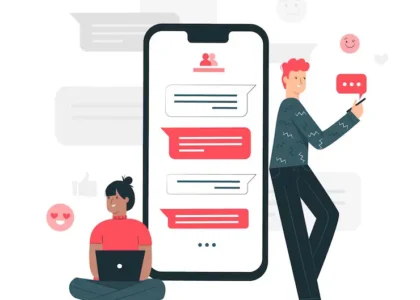How AI is Revolutionizing Digital Marketing
Artificial Intelligence (AI) is no longer a buzzword; it has become an integral part of various industries, including digital marketing.
The rapid advancements in AI technology are transforming how businesses approach marketing strategies, providing more personalized, efficient, and data-driven solutions.
In this comprehensive guide, we will explore how AI is revolutionizing digital marketing, from enhancing customer experiences to optimizing campaigns, improving analytics, and automating processes.
The Role of AI in Digital Marketing
AI plays a pivotal role in reshaping digital marketing by leveraging data analysis, machine learning, and automation.
Marketers are now able to deliver more targeted and relevant content to consumers, predict trends, and optimize marketing efforts with precision.
Key AI Technologies Impacting Digital Marketing
AI’s influence in digital marketing stems from several cutting-edge technologies. Here are the key technologies driving this transformation:
Machine Learning (ML)
Machine learning is a subset of AI that allows systems to learn from data and improve over time without being explicitly programmed. In digital marketing, ML helps predict customer behavior, analyze user interactions, and optimize campaigns in real-time.
- Personalization: ML algorithms analyze user data and provide personalized content, product recommendations, and ads. This improves engagement and conversion rates as users receive information tailored to their preferences.
- Customer Segmentation: By analyzing large datasets, ML helps marketers segment their audience more accurately based on behavior, demographics, and preferences, allowing for more precise targeting.
Natural Language Processing (NLP)
NLP enables machines to understand, interpret, and respond to human language. This technology powers chatbots, voice assistants, and content generation tools, improving customer interactions and automating tasks.
- Chatbots and Virtual Assistants: AI-powered chatbots are becoming increasingly popular in customer service, providing instant support and resolving issues in real-time. They can answer FAQs, assist with product inquiries, and even guide users through the sales funnel.
- Voice Search Optimization: As voice search becomes more common, optimizing content for voice-based queries is essential. AI-powered tools help businesses create voice-friendly content, catering to users who prefer voice searches through virtual assistants like Siri, Alexa, or Google Assistant.
Predictive Analytics
AI-driven predictive analytics uses historical data to forecast future outcomes. In digital marketing, it helps marketers predict customer behavior, future trends, and campaign performance.
- Customer Lifetime Value (CLV): AI models predict which customers are likely to bring the most value over time, allowing businesses to focus marketing efforts on high-value customers.
- Churn Prediction: AI can identify patterns that indicate when a customer is likely to churn, allowing marketers to deploy retention strategies proactively.
Computer Vision
Computer vision allows machines to interpret and process visual data, which is crucial for image and video-based marketing strategies.
- Image Recognition: AI can analyze visual content, categorize images, and identify products, which can be used in targeted ads, product tagging, and social media campaigns.
- Augmented Reality (AR): AI-powered AR features are transforming the way customers shop online by allowing them to visualize products in their environment before making a purchase, improving user experience and boosting sales.
AI-Driven Personalization in Digital Marketing
Personalization is at the heart of successful digital marketing campaigns, and AI is making personalization more sophisticated than ever before.
Here’s how AI is improving the way brands interact with customers:
- Personalized Content Recommendations
AI-driven recommendation engines analyze user behavior, purchase history, and preferences to suggest content, products, or services that are most relevant to each individual user.
Platforms like Netflix and Amazon use this technique to provide personalized experiences, driving engagement and conversions.
- Dynamic Email Campaigns
AI helps create hyper-personalized email campaigns by tailoring content, subject lines, and sending times based on individual recipient behavior and preferences.
This ensures that emails are more likely to be opened, read, and acted upon.
- Personalized Advertising
AI helps in delivering personalized ads by analyzing user data and showing ads that are most likely to resonate with the target audience.
Dynamic ad creatives can change based on real-time data, making ads more relevant and effective.
AI for Content Creation and Curation
AI is also changing the game when it comes to content creation and curation, helping marketers produce high-quality, relevant content at scale.
- Automated Content Generation
AI-powered tools like GPT-3 can now generate written content, from blog posts to social media updates.
While human creativity is still essential, AI can assist in producing the first draft of content, saving marketers time and effort.
- Content Curation
AI tools analyze user preferences and curate content that aligns with their interests.
This not only helps brands keep their audiences engaged but also ensures that users are exposed to the most relevant and trending content.
AI-Enhanced SEO Strategies
Search engine optimization (SEO) remains a vital component of digital marketing, and AI is helping marketers stay ahead of the curve by offering new ways to optimize content for search engines.
- Voice Search Optimization
With the rise of voice search, AI is helping marketers optimize content to match how people speak rather than type.
This involves focusing on long-tail keywords, conversational language, and answering direct questions that users might ask through voice search.
- Automated SEO Audits
AI-powered SEO tools analyze websites, identify areas for improvement, and suggest optimizations, such as keyword placement, meta tags, and content structure.
This automation helps marketers improve their website’s SEO performance without manual effort.
- Predictive SEO
AI can predict which keywords and topics are likely to trend in the future, helping marketers create content that will rank high before those trends even take off.
AI in Social Media Marketing
Social media marketing is another area where AI is making a significant impact, helping businesses streamline their efforts and engage with audiences more effectively.
- Social Listening
AI-powered social listening tools analyze online conversations to identify trends, customer sentiment, and competitors’ strategies.
This helps marketers tailor their social media content and engagement strategies to what’s currently resonating with their target audience.
- Predictive Social Media Analytics
AI tools can predict the performance of social media posts by analyzing historical data, allowing marketers to optimize their content and posting times for maximum engagement.
- Automated Social Media Management
AI tools like Hootsuite and Buffer can schedule posts, respond to customer inquiries, and analyze engagement metrics automatically, saving marketers time and effort.
AI-Powered Advertising
AI is also transforming how businesses approach paid advertising, helping them create more effective campaigns with better targeting and higher ROI.
Programmatic Advertising
AI-driven programmatic advertising automates the process of buying and placing ads, using data to target the right audience at the right time.
This allows marketers to create highly targeted campaigns with minimal manual input.
Ad Personalization
AI enables the creation of dynamic ads that change based on user behavior and preferences.
These ads are more likely to catch the attention of the target audience and convert leads into customers.
Predictive Ad Spend Optimization
AI helps businesses allocate their advertising budgets more efficiently by predicting which channels and strategies will yield the highest ROI.
Challenges and Ethical Considerations
While AI is revolutionizing digital marketing, it’s essential to be aware of the challenges and ethical considerations involved.
- Data Privacy
AI relies heavily on data, and with the increasing use of personal information, businesses must ensure they comply with data privacy regulations like GDPR. Transparency in data collection and usage is crucial to maintain consumer trust.
- Maintaining a Human Touch
Despite the automation and efficiency AI brings, digital marketing still requires a human touch. Marketers must strike a balance between AI-driven automation and genuine, empathetic customer interactions to build lasting relationships.
The Future of AI in Digital Marketing
AI’s influence on digital marketing will only continue to grow, with emerging technologies like deep learning and neural networks pushing the boundaries of what’s possible.
Marketers who embrace AI-driven strategies will be well-positioned to succeed in the future.
Conclusion: AI is Shaping the Future of Digital Marketing
AI is transforming digital marketing in ways that were unimaginable just a few years ago.
From personalized content to predictive analytics, AI is helping marketers create more effective, efficient, and engaging campaigns.
As AI technology continues to evolve, businesses that leverage these tools will be able to stay ahead of the competition and deliver exceptional customer experiences.
If you’re looking to stay competitive in the ever-evolving world of digital marketing, embracing AI is no longer an option—it’s a necessity.





